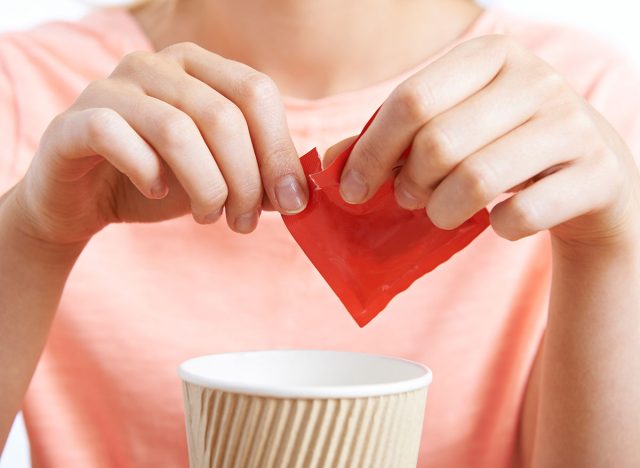Nonstick Pans, Ultra-processed Foods, & Artificial Sweeteners Are Linked to Cancer, Science Says

Have you ever felt overwhelmed by all of the information out there regarding the dangers of certain foods, drinks, and household products? New research is constantly released with findings that show how these necessities, which we depend on daily, are made with harmful chemicals and ingredients, often leaving us to wonder if it’s safe to use or consume these things at all. Unfortunately, this past year was no exception when it comes to new scientific discoveries about health hazards in our homes. In fact, three common items you’d find in your kitchen were linked to cancer in 2022.
Between the nonstick cookware you use to prepare your food, the sweeteners you might use to make your favorite items taste better, and the ever-indulgent ultra-processed foods you may opt to splurge on, scientific research revealed that we might not be doing our health any favors by having these items in our lives. Of course, this raises many questions: How harmful are these items, exactly? Should you get rid of them completely, or is moderate exposure and usage still safe? Finally, what are the implications of these scientific findings today and beyond?
Keep reading to uncover some of the answers to these burning questions. Also, for more healthy eating tips that can potentially help you prevent the onset of cancer, check out The Best Eating Habit to Lower Your Cancer Risk, New Study Says.
Nonstick cookware

The link between nonstick cookware and our health has proven to be a complicated one over the years. Per- and polyfluoroalkyl substances—or PFAS—are synthetic chemicals used in items like waterproof clothing, cleaning products, and nonstick cookware. These substances are known to be among the top catalysts to a number of health risks associated with nonstick pans. In fact, PFAS are sometimes referred to as “forever chemicals” because they digest extremely slowly and are known to stay in your body and the environment forever.
Past studies have found a link between PFAS and things like liver disease and cancer, but much of this research was performed on animals, which limited our overall understanding. According to Insider.com, another complication with studying the effects of PFAS on cancer risk is that many other factors can impact a person’s development of cancer, and exposing human subjects to actual carcinogens for the sake of research obviously poses many ethical violations. Because of this, understanding of the direct impact of PFAS on human health remained largely misunderstood—that is, until a new study was released in October of 2022.
This research, which was published in JHEP Reports Innovation in Hepatology, is incredibly significant because of how it confirms that there is a link between PFAS and liver cancer. Not only that, but it used human samples from previously gathered blood and tissue of over 200,000 people. Of these samples, 50 were found to have developed liver cancer. And when researchers took a look at their blood before their cancer development, they found high levels of PFAS. According to a news release on the study from the Keck School of Medicine of USC, participants in the top 10% of those who were exposed to PFAS were 4.5 times more likely to develop liver cancer than those who were in the bottom 10%.
So, how does all of this affect you and your future omelet-flipping endeavors? Going forward, you want to first consider what kind of cookware you’re using before you get to cooking. To guarantee a much safer cooking experience, see if there’s an alternative to nonstick pan that you’ll find just as useful, like a cast-iron skillet or a stainless steel one.
Ultra-processed foods

It should come as no surprise that diets higher in ultra-processed foods—think fast food, soda, packaged baked goods—have been linked to various health complications. Past research has found a connection between ultra-processed foods and increased risk of cardiovascular disease, type 2 diabetes, and obesity. However, in August of 2022, a new study was released to show a confirmed link between these foods and colorectal cancer, particularly in men.
The study, which was published in the British Medical Journal, looked at three large cohorts, which included 3,216 cases of colorectal cancer. Among these cases, those who had the highest consumption of ultra-processed foods had a 29% higher chance of developing cancer compared to those who consumed the lowest amount of these foods. Interestingly enough, higher consumption of processed meat, seafood, and poultry products, as well as sodas, were found to be the leading causes of this increased risk when compared to other types of ultra-processed foods. Also, although the study assessed both male and female participants, no connection between ultra-processed foods and colorectal cancer was found in women.
The main takeaways from this research can be used as motivation to try incorporating more whole, unprocessed, and even plant-based foods into your daily diet. This isn’t to say that you can’t enjoy your favorite processed items every now and again, but limiting your consumption can benefit your overall health and potentially reduce your risk of cancer.
Artificial sweeteners

It’s oftentimes suggested to choose diet soda over regular, in order to lower your added sugar intake. Unfortunately, research from March 2022 found a possible connection between artificial sweeteners, like those used in diet drinks, and an increased risk of cancer.
The study, which was published in PLOS Medicine, looked into the potential cancer-causing effects of three popular kinds of artificial sweeteners: aspartame, sucralose, and acesulfame-K, with diet sodas and table-top sugar alternatives being some of the most common sources of these sweeteners. Researchers found that of over 100,000 French adults, those who consumed the highest amounts of these artificial sweeteners had a 13% higher risk of developing cancer, with aspartame and acesulfame-K specifically contributing to the highest risk.
Findings like these can feel defeating because it seems impossible to win, right? On one hand, experts say to avoid drinking soda because of the added sugar. However, on the other hand, studies like this one point to the dangers of diet drinks, too. For 2023, you may benefit from seeking out balance when it comes to your favorite beverages. If you’re a daily soda drinker, replacing this habit with daily diet soda may prove to be a problem for your health. However, cutting your consumption and enjoying these beverages as a special treat from time to time can help your overall health, while still allowing you to drink what you love.
- Source: https://www.epa.gov/pfas/pfas-explained
- Source: https://ehp.niehs.nih.gov/doi/10.1289/EHP10092
- Source: https://www.jhep-reports.eu/article/S2589-5559(22)00122-7/fulltext
- Source: https://www.eurekalert.org/news-releases/961105
- Source: https://www.ncbi.nlm.nih.gov/pmc/articles/PMC7399967/
- Source: https://www.bmj.com/content/378/bmj-2021-068921
- Source: https://journals.plos.org/plosmedicine/article?id=10.1371/journal.pmed.1003950#sec016









